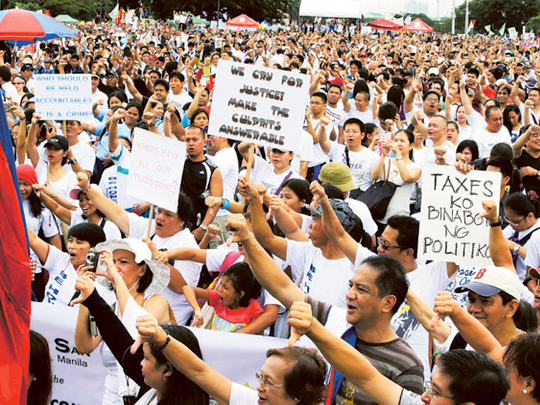
Manila: President Benigno Aquino has faced for the first time since his election in 2010 a “social cyclone” of one million marchers who called for an end to the misuse of lawmakers’ countrywide development funds, in simultaneous protests rallies held on Monday at Manila’s central park, in the provinces, and in Filipino communities abroad.
“We are all disgusted with the extent of corruption in the legislative level,” said Pastor Alfred Crespo, who is affiliated with a non Catholic Christian group that joined the “a million people march” at the Luneta Park which looked like a sea of protesters from all walks of life, from nine in the morning to three in the afternoon.
Marchers brought along effigies of pigs to dramatise their disgust over legislated “pork barrel”, the other name of the lawmakers’ Priority Development Assistance Fund (PDAF).
Reports from six whistle-blowers who claimed that lawmakers and money launderers have been colluding for years to funnel large sums of money to fake projects and nonexistent non-government organisations, was “a rude awakening for everyone,” said Crespo.
“This kind of institutionalised corruption, done for years, makes it look like an art perfected by government officials.
“We will force the lawmakers including the executive level that releases these funds to let go of it. This rally is only the tip of the iceberg of our discontent,” warned John Dee, a student protester.
At nine in the morning, the atmosphere in Luneta was both festive and angry. Artists performed street drama, singers sang songs and bands played their favourite musical instruments.
The musical composition of Jo Grad del la Torre, entitled “Kawatan [Thief]” became the protest rally’s anthem after it went viral on YouTube over the weekend.
A stage actor portrayed a sad Jose Rizal, the country’s national hero who was ordered by the Spanish colonials to be killed (after he published two anti-Spanish novels) in a firing squad in 1896.
“Epal [Filipino word for traditional politicians] are barred from attending this rally,” said an angry placard. “We, the [protesting] people are now the boss. We have run out of patience,” was emblazoned on a big placard. “Moderate your greed,” was a warning from a militant group’s big banner.
At two in the afternoon, Luneta was crowded with a mixture of several personalities from the middle class and the entertainment industry, including members of leftist organisations, religious and church-based associations, professionals and businessmen’s group, and organised urban poor.
Participants were asked to affix their signature on a document called, “Change Accord”. It was the only hint that an organised protest rally was going on.
The collection of signatories will be done nationwide, and among other Filipino communities abroad, said an organiser who requested for anonymity.
Manila Archbishop Cardinal Luis Antonio Tagle took centre stage and prayed about the importance of integrity, saying: “Let us prove that the Filipino is an honourable being because he is God-fearing, he respects life, he values his fellowmen, he has compassion for his nation, and love for the environment.”
His presence was a sign of a massive Catholic church support for the anti-corruption rally.
Explaining why this kind of protest rally caught fire, without known leaders, and among groups that were stirred virally by social media, including bloggers, Facebook and Twitter users, sociologist and columnist Randy David said: “The people felt betrayed by the politicians they had elected. And the government’s response was not immediate and proper.”
On Sunday, online supporters even revealed their respective manifesto of support for the rally.
It’s possible impact was compared to the consequences of the so-called Arab Spring in which spontaneous and social-media led protests rallies in several Arab countries, although initially peaceful, eventually turned into riots and civil wars.
“The indignation rally has been pushing President Aquino to a clash with Congress where his allies form a majority. A move to stop the people’s current disappointment could enhance Aquino’s moral stance but also weaken his ties with Congress, where his political strength is anchored,” explained a palace insider.
On Monday morning, at the commemoration of Heroes’ Day, President Aquino said in a speech: “Culprits should be punished. Reforms must be instituted in the system [of allocating countrywide development fund for senators and congressmen] so that it will retain its good and noble purpose.”
Earlier, a businesswoman who was identified as behind the alleged laundering of P10 billion (Dh830 million) worth of lawmakers’ “pork” starting 2010 went missing.
Last Friday, Aquino passed a resolution calling for the scrapping of allocation for the lawmakers’ development fund. He was criticised for giving a belated support for the anti-corruption rally.
But the national budget for 2014, which was prepared earlier, will still include allocations for the lawmakers’ “pork”, estimated at P25.2 billion. This will be eradicated only in the 2015 national budget, once it is prepared in late 2013, explained Budget Secretary Florencio Abad. He hinted that lawmakers would not be prevented from proposing their pet projects to the executive level.
The upper and lower houses of Congress approve the passage of the country’s national budget.












